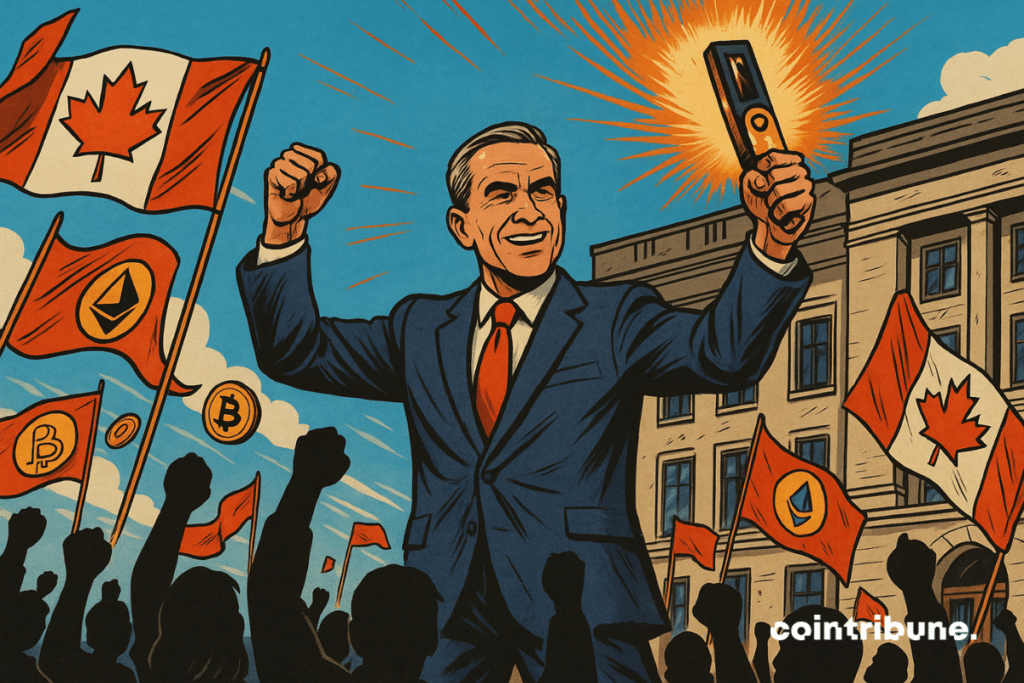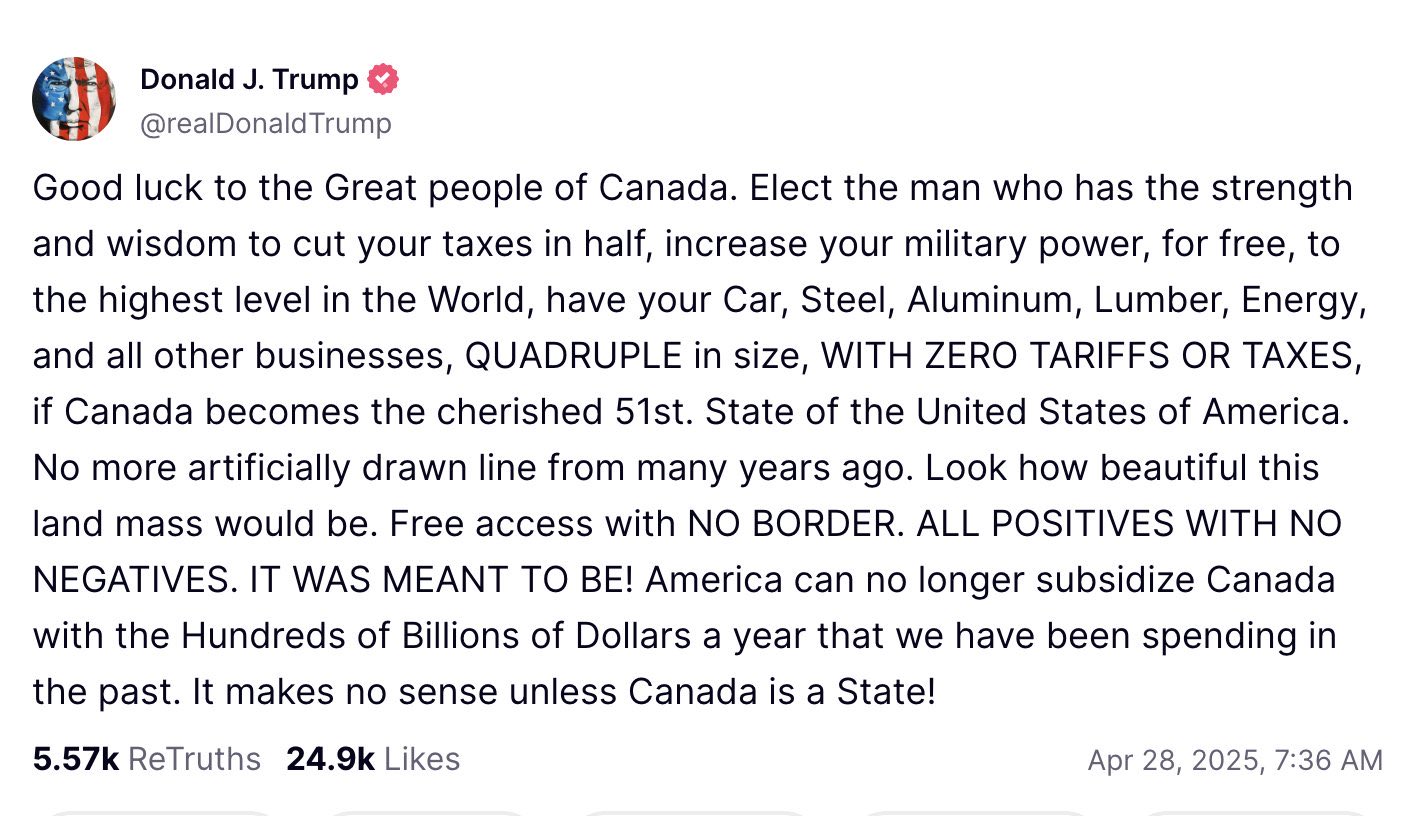Mark Carney Elected Prime Minister: What Lies Ahead for Crypto in Canada?
Mark Carney’s election as leader of the Liberal Party of Canada paused a few breaths. For some Canadians, this victory was no longer a surprise. Even on the PolyMarket platform, crypto bettors had given Carney a 79% chance of winning the race. This change in leadership came in an increasingly tense political climate, notably with rising trade tensions between Canada and the United States. Carney, former governor of the Bank of Canada and the Bank of England, is about to take on a key role in an uncertain economic context, and his vision of monetary policy and cryptocurrencies could well redefine the contours of the Canadian economy in the years to come.

In Brief
- Mark Carney becomes Prime Minister of Canada after a stunning victory.
- Carney opposes Trump and American economic policies.
- He criticizes cryptocurrencies, advocating strict regulation and CBDCs.
- Carney supports innovation, but within a regulated and secure framework.
A Victory Marked by Crisis and Economic Pragmatism
Mark Carney succeeded in convincing Canadians that he was the man of the situation, the one capable of managing economic and political crises. And not the pro-crypto candidate Pierre Poilievre. His exceptional background in finance, notably during the 2008 crisis, made him a respected figure beyond Canadian borders. But his political rise also coincided with a resurgence of tensions with Donald Trump.
While Canada was bearing the full effects of tariffs imposed by the Trump administration, Carney established himself as the leader capable of standing up to this external pressure.
In his victory speech, he clearly expressed his rejection of American policy, describing Trump’s attempts as “betrayal” and calling for strengthened national unity to face this new reality.
“The Americans want our country, our resources, our water,” he declared.
In this stance, Carney distinguishes himself from his main rival, Pierre Poilievre, a conservative who often had more conciliatory rhetoric towards the United States. Poilievre’s alignment with some pro-Trump figures, like Elon Musk and crypto leaders, however, has worked against him, while Carney played on his reputation as a pragmatic technocrat, keen to defend Canada’s interests above all.
The Anti-Trump Profile: An Asset for Canada?
The relationship between Carney and Donald Trump is not new. As a former governor of the Bank of England, Carney had several occasions to cross paths with the American president, notably at international meetings where Trump defended his protectionist and populist vision. Carney has never hidden his opposition to the trade policies of the former American administration.
We will stand up to a tyrant; we will not give in.
This places him in a favorable position in the eyes of Canadians, who see in him a bulwark against the external threat. While Poilievre sought to stoke the pro-Trump flame in Canada, Carney focused his discourse on the importance of protecting Canadian sovereignty. For Canada, this contrast could not be more marked: a progressive leader, resolutely pro-multilateralism, versus a conservative opponent influenced by Trumpist ideals.
This strong leader profile against Trump is all the more relevant in the current geopolitical context. Carney, through his measured approach and desire to defend free trade while maintaining balanced relations, seems to have captured the concerns of the majority of Canadians, for whom political and economic stability is more precious than ever.

Mark Carney and Crypto: A Critical View
Mark Carney has always been very critical of cryptocurrencies, notably bitcoin. In his 2018 speech at the Bank of England, he called bitcoin a “poor store of value“, emphasizing that the cryptocurrency did not fulfill the three essential functions of money: medium of exchange, unit of account, and store of value.
For Carney, cryptocurrencies, despite their popularity, fall far short of meeting users’ long-term expectations. According to him, cryptos are only useful in very limited situations, and it is only alongside fiat currencies that bitcoin and others can claim any significant economic role.
But that’s not all. Carney has also expressed concerns about stablecoins and the fragmentation of the global monetary economy they could cause. During the 2021 Crockett Memorial Lecture, he stated that private stablecoins require strict regulation to ensure financial stability. He specified:
The stablecoin market could fragment liquidity within the monetary system and weaken money’s role as a coordination device.
The solution he advocates? The implementation of central bank digital currencies (CBDCs). Carney supports the idea that a CBDC could offer considerable advantages, notably in terms of reducing transaction costs, speeding payments, and securing exchanges.
As a fervent advocate of CBDCs, Carney has also emphasized the need for interconnection with regulated private institutions to foster a coherent and secure financial environment. According to him, this model would avoid the dangers posed by private cryptocurrencies while promoting innovation in the digital banking sector.
The underlying technologies are exciting, but solutions must improve financial stability, while supporting more innovative and reliable payment services.
For Carney, cryptocurrencies, although interesting, are only a part of a larger puzzle that he intends to solve through regulation and the introduction of CBDCs in Canada.
Carney and the Tightening of Crypto Regulations
Carney has always shown himself in favor of regulating the cryptocurrency sector. According to him, although the underlying technology is promising, the growth of cryptos must be regulated to protect investors and prevent market manipulation.
The best cryptocurrencies will naturally gravitate towards the best exchanges, provided they are regulated.
Regulation, far from stifling innovation, could according to Carney pave the way for a stable and reliable framework for cryptocurrencies. However, the shift from a relatively free environment to a more regulated ecosystem could be seen by some as a restriction. Carney intends to position himself as a responsible leader, promoting reasoned adoption of innovative technologies while preserving the country’s economic balances.
Canada, traditionally supportive of innovation, could under Carney’s impetus adopt a much stricter stance towards cryptocurrencies, potentially limiting their use in favor of CBDCs. The country could therefore gradually redirect its efforts to integrate sovereign digital currencies into an economy where regulation is becoming essential.
Carney’s arrival at Canada’s helm could mark a decisive turning point for the country’s crypto-economy. While the Canadian government has recently hardened its position, Carney could well strengthen these regulations, paving the way for wider adoption of CBDCs, while limiting the space for private cryptocurrencies.
Maximize your Cointribune experience with our "Read to Earn" program! For every article you read, earn points and access exclusive rewards. Sign up now and start earning benefits.
La révolution blockchain et crypto est en marche ! Et le jour où les impacts se feront ressentir sur l’économie la plus vulnérable de ce Monde, contre toute espérance, je dirai que j’y étais pour quelque chose
The views, thoughts, and opinions expressed in this article belong solely to the author, and should not be taken as investment advice. Do your own research before taking any investment decisions.